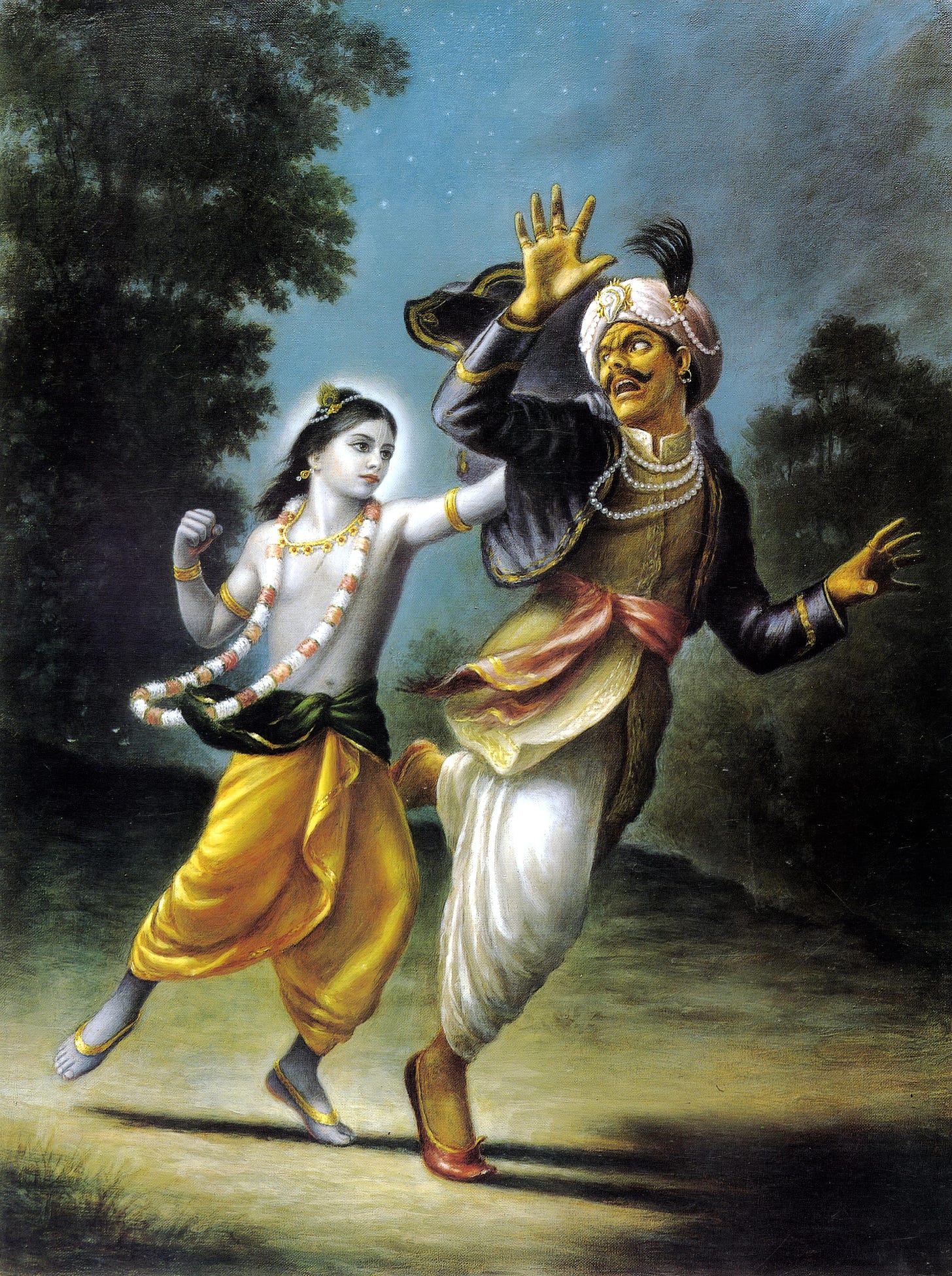Loving Krsna and mistreating His devotees
Imagine the following scene: You meet your old best friend, Haridas, whom you haven’t seen for many years. However, as you get close, you notice he is not happy at all to see you. Why?
Imagine the following scene. You meet your old best friend, Haridas, whom you haven’t seen for many years. You become emotional in seeing him, and run in his direction, saying: “Haridas, It’s me, I’m so happy to see you!”. However, as you get close, you notice he is not happy at all to see you. As a result, you stop. You look around and see some small children scattered here and there. One has hurt his leg, and the other one is crying. In your rush to embrace your friend, you carelessly knocked down all these children, his children! How do you think Haridas feels?
Often, in our rush to get things done for Krsna, we treat his devotees carelessly and may even hurt a few of them in the process. This is like getting close to Krsna by knocking down his children; it doesn’t work very well.
Unfortunately, this mentality is not at all rare. It happened a lot in the past, and can still be found in many places. Usually, the more active a place is, the more it tends to happen.
Why is it so?
This is a characteristic of devotional service performed under the influence of the modes of passion and ignorance. Most people nowadays are influenced by these gunas, and when they come to practice devotional service, their service tends to be performed under these two material modes at first.
This phenomenon is explained by Lord Kapila in his teachings:
"Devotional service executed by a person who is envious, proud, violent and angry, and who is a separatist, is considered to be in the mode of darkness.
The worship of Deities in the temple by a separatist, with a motive for material enjoyment, fame and opulence, is devotion in the mode of passion." (SB 3.29.8-9)
In his purport to 3.29.8, Prabhupada explains:
"One who approaches the Supreme Lord to render devotional service but who is proud of his personality, envious of others or vengeful is in the mode of anger. He thinks that he is the best devotee. Devotional service executed in this way is not pure; it is mixed and is of the lowest grade, tāmasaḥ. Śrīla Viśvanātha Cakravartī Ṭhākura advises that a Vaiṣṇava who is not of good character should be avoided. A Vaiṣṇava is one who has taken the Supreme Personality of Godhead as the ultimate goal of life, but if one is not pure and still has motives, then he is not a Vaiṣṇava of the first order of good character. One may offer his respects to such a Vaiṣṇava because he has accepted the Supreme Lord as the ultimate goal of life, but one should not keep company with a Vaiṣṇava who is in the mode of ignorance."
The way one treats others is one of the most reliable ways to understand one’s level of advancement in spiritual life. As one’s ego comes under control, his awareness of others as parts and parcels of Krsna grows. A materialistic devotee has a very big ego. He sees himself and a few others of the group that he identifies with as the only pure devotees. Consequently, he mistreats not only people in general but other devotees as well. An intermediary devotee is capable of understanding the greatness of other devotees of the Lord, and he treats them with respect. However, he still sees himself as better than ordinary people, and he may thus mistreat them on occasion.
The positive alternative is given on SB 4.30.8, by Lord Viṣnu acknowledging the perfection of the Pracetas and revealing how satisfied He is with them:
"The Supreme Personality of Godhead said: My dear sons of the King, I am very much pleased by the friendly relationships among you. All of you are engaged in one occupation — devotional service. I am so pleased with your mutual friendship that I wish you all good fortune. Now you may ask a benediction of Me."
How can we be elevated to the same platform? Prabhupada explains in his purport:
"Each and every one of the sons of King Prācīnabarhiṣat was an individual soul, but they were united in offering transcendental service to the Lord. The unity of the individual souls attempting to satisfy the Supreme Lord or rendering service to the Lord is real unity. In the material world such unity is not possible. Even though people may officially unite, they all have different interests. In the United Nations, for instance, all the nations have their particular national ambitions, and consequently they cannot be united. Disunity between individual souls is so strong within this material world that even in a society of Kṛṣṇa consciousness, members sometimes appear disunited due to their having different opinions and leaning toward material things. Actually, in Kṛṣṇa consciousness there cannot be two opinions. There is only one goal: to serve Kṛṣṇa to one’s best ability. If there is some disagreement over service, such disagreement is to be taken as spiritual. Those who are actually engaged in the service of the Supreme Personality of Godhead cannot be disunited in any circumstance. This makes the Supreme Personality of Godhead very happy and willing to award all kinds of benediction to His devotees, as indicated in this verse."
Just as the influence of passion and ignorance is the cause of many mistakes we make while trying to serve Krsna, the absence of such an influence allows us to treat other devotees warmly, cooperate with them, and thus perfect our devotional service. This comes as we advance in the process of hearing and chanting, due to the purification it brings. It may take a few years, but it can also come quickly, depending on the quality of our chanting.
A pure devotee sees everyone as parts and parcels of Krsna, and under this consciousness, he is respectful to everyone. If he is preaching, he discriminates amongst devotees and non-devotees, following the guidelines given in the sastras and tries to help people to become Krsna Conscious, but internally he sees everyone as an eternal servant of Krsna, worthy of his service. It’s mentioned that one should try to become an intermediary devotee as quickly as possible. The position of a materialistic devotee is very dangerous because his big ego and his divisive nature make it difficult for him or her to serve without committing offenses to others, and such offenses can easily push one away from the path of devotional service
We can see that many spiritual masters nowadays focus on teaching devotees to improve their chanting and hearing, identifying that this is the aspect of devotional practice that can bring the best benefits, especially in the beginning. If we can get a good foundation on the process of hearing and chanting, combined with the practice of basic rules and regulations (following the four principles, etc.) and good association, we can become cleansed of the influence of passion and ignorance relatively quickly, and thus avoid this initial phase of knocking down and disregarding others while trying to serve Krsna.
Read also:
Purañjana comes to the path of devotional service (Srimad Bhagavatam #72)
Just as in the first part of the allegory, Srila Prabhupada adds a completely new layer of understanding to the passage of Purañjana taking his next birth as a woman.
If you read this article to the end, give it a like. This makes Substack recommend it to more people.



